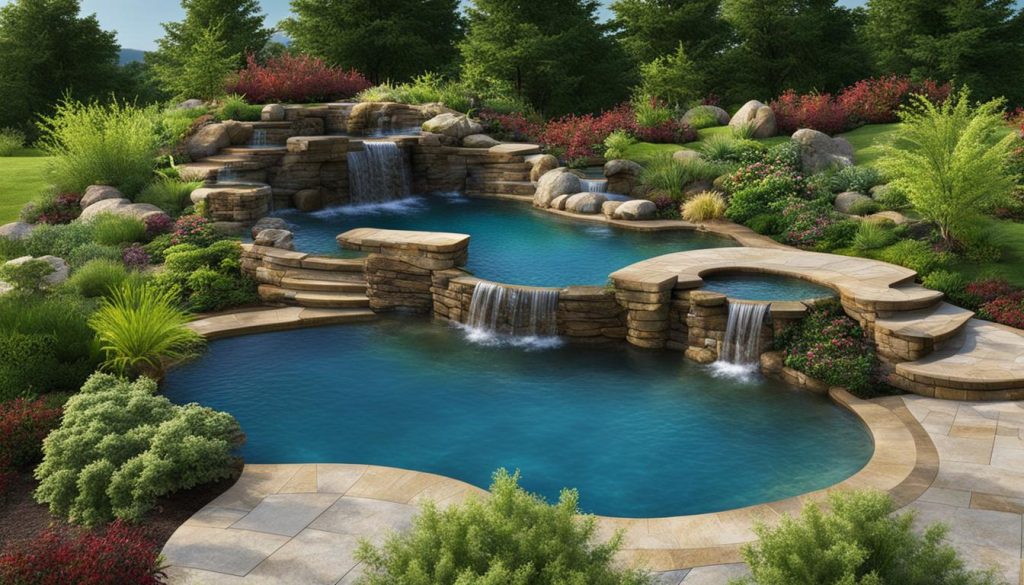Welcome to our article where we will explore the differences between natural pools and traditional pools. When deciding which type of pool to install in your Canadian home, it’s essential to consider the pros and cons of each option. Natural pools are becoming increasingly popular due to their eco-friendliness, while traditional pools have been a popular choice for years due to their low maintenance. We’ll dive into the details to help you make an informed decision.
Key Takeaways:
- It’s essential to weigh the advantages and disadvantages of natural pools and traditional pools before making a decision.
- Natural pools use plants, natural filtration systems, and beneficial bacteria to maintain water quality, while traditional pools use chemicals like chlorine.
- Natural pools offer a chemical-free swimming experience and support biodiversity, but require more maintenance and can be more expensive to build.
- Traditional pools provide clear and sanitized water, require less maintenance, and offer more design options, but use chemicals and can be more expensive to maintain long-term.
- Ultimately, the choice between a natural pool and a traditional pool comes down to individual priorities and preferences.
What are Natural Pools?
At first glance, natural pools resemble a serene pond or lake. But don’t let their natural appearance fool you. These pools are designed to provide a chemical-free and eco-friendly swimming experience.
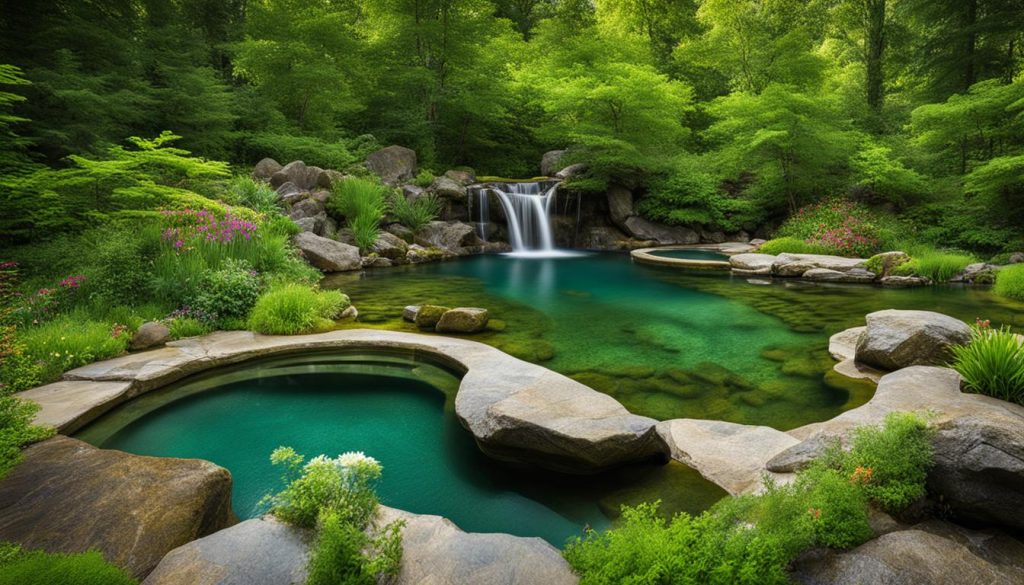
Unlike traditional pools, natural pools rely on plants, natural filtration systems, and beneficial bacteria to maintain water quality. These pools do not use chemicals like chlorine, making them safer for your skin, eyes, and respiratory system.
Natural pools are also known as eco-pools or chemical-free pools. They have grown in popularity in recent years as more people seek alternatives to traditional pools that rely on harsh chemicals.
One of the most significant differences between natural and traditional pools is their maintenance requirements. Natural pools require more monitoring and maintenance to ensure proper water balance and clarity. But for many people, the benefits of a chemical-free swimming experience and an eco-friendly option outweigh the extra maintenance effort.
The Components of a Natural Pool
A natural pool consists of two main components: the swimming area and the regeneration zone. The swimming area is where you swim and enjoy the pool, while the regeneration zone contains the filtration system. This zone uses plants, gravel, and beneficial bacteria to clean the water and maintain its quality.
| Components | Natural Pools | Traditional Pools |
|---|---|---|
| Chemicals | No harsh chemicals, natural filtration | Chlorine and other harsh chemicals |
| Maintenance | Require more monitoring and maintenance | Easier maintenance |
| Design | Natural-looking design | More flexibility in design and customization |
As you can see in the table above, there are clear differences between natural and traditional pools. Understanding these differences will help you make an informed decision when deciding which pool option is right for your Canadian home.
The Benefits of Natural Pools
When it comes to natural pools, there are several advantages that make them a popular choice for homeowners.
- Chemical-free swimming experience: Natural pools offer a swim free from harmful chemicals like chlorine, making it a healthier option for you and your loved ones. Chlorine can cause skin and eye irritation, especially for individuals with sensitive skin. With a natural pool, you don’t have to worry about these health risks.
- Biodiversity: By creating a habitat for plants and animals, natural pools support biodiversity. They can attract a variety of wildlife, from insects to birds, providing a more natural and tranquil environment.
- Aesthetics: The natural-looking design of a natural pool can enhance the beauty of your backyard and complement your Canadian home’s natural surroundings. With its lush plants and natural rock formations, a natural pool can blend seamlessly into your outdoor space.
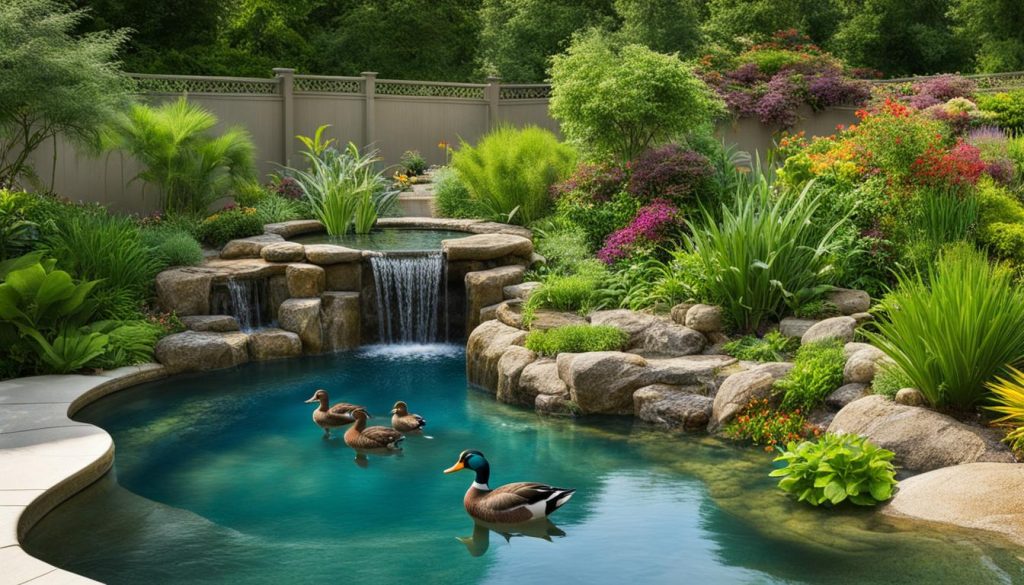
In addition to these benefits, natural pools are also environmentally friendly. They use fewer resources and energy compared to traditional pools. Natural pools require less water and electricity to maintain, reducing your carbon footprint and overall impact on the environment.
Lower Cost of Ownership
While natural pools may have a higher upfront cost to build and install the natural filtration system, they often have a lower cost of ownership over time. Chemical-free water eliminates the need for expensive chemicals and reduces the need for constant maintenance and repairs. As a result, your natural pool will likely cost less to maintain and operate in the long run.
The Drawbacks of Natural Pools
While natural pools have many benefits, they also have some drawbacks to consider before making a final decision for your Canadian home.
| Drawback | Description |
|---|---|
| Higher Maintenance | Natural pools require more maintenance compared to traditional pools. The plants and beneficial bacteria need to be regularly maintained to ensure proper water balance and clarity. This can be time-consuming and require more effort on the homeowner’s part. |
| Initial Cost | Natural pools can be more expensive to build initially compared to traditional pools due to the additional materials and labor required for their construction. This cost may be offset by lower maintenance costs in the long run, but it is still a significant factor to consider. |
| Water Clarity | The water in natural pools may not be as crystal clear as in traditional pools, due to the absence of chemicals to disinfect and maintain water clarity. While natural pools utilize natural filtration systems, the water may have a slightly earthy smell, which can be a drawback for some people. |
Despite these drawbacks, natural pools can still be a great choice for homeowners who prioritize eco-friendliness and a chemical-free swimming experience. It ultimately depends on your personal preferences and priorities.
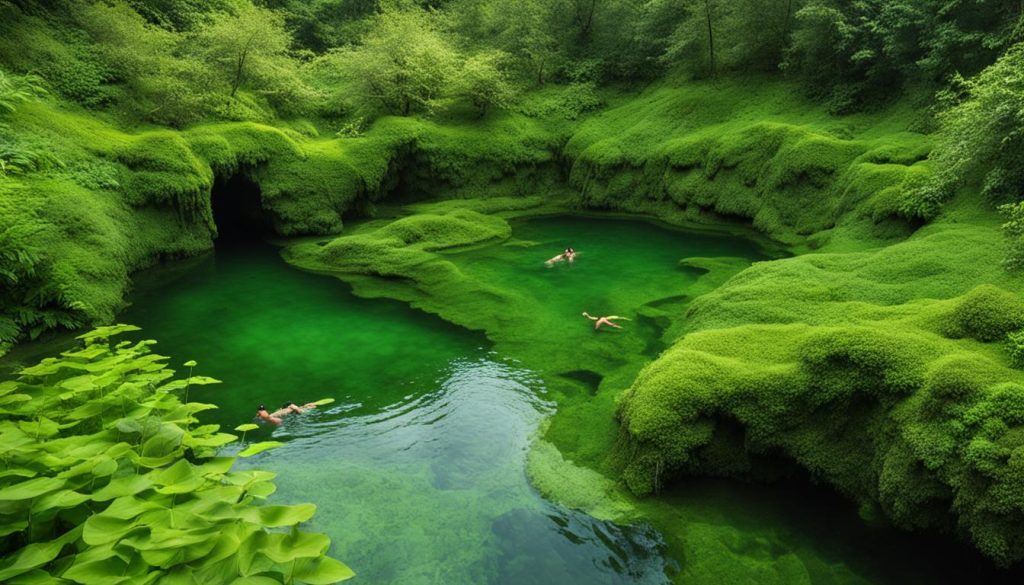
What are Traditional Pools?
Traditional pools are the most common type of swimming pool found in Canadian homes. These pools use chemicals like chlorine to sanitize and disinfect the water. They typically have a concrete or fiberglass structure with a traditional filtration and heating system.
Traditional pools offer a clear and sanitized swimming experience, ensuring a safe environment for you and your family. They also require less maintenance compared to natural pools as the chemicals used in traditional pools help regulate the water balance, eliminating the need for continuous monitoring. Additionally, traditional pools offer more flexibility in terms of design and customization options, making it easier to create a pool that fits your taste and preferences.
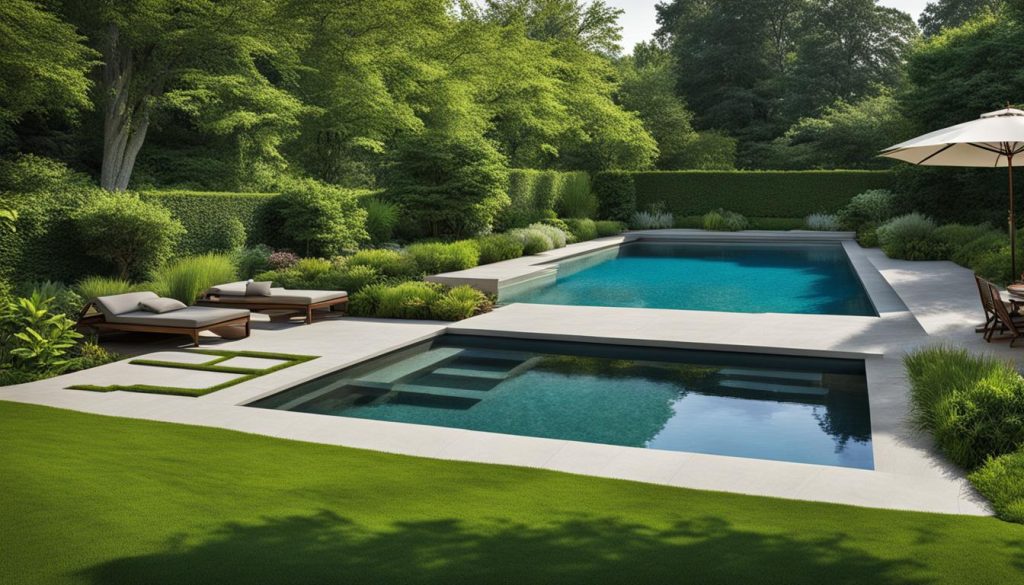
| Advantages | Disadvantages |
|---|---|
| Clear and sanitized water | Chemicals can cause skin and eye irritation |
| Less maintenance compared to natural pools | Higher ecological impact due to the use of chemicals |
| More flexibility in terms of design and customization options | Maintenance costs can add up over time |
While traditional pools have their advantages, they also have certain disadvantages. The chemicals used in these pools can cause skin and eye irritation, especially for individuals with sensitive skin. Traditional pools may also have a higher ecological impact due to the use of chemicals, which can be harmful to the environment. Moreover, the maintenance costs of traditional pools can add up over time, making it important to factor in the ongoing expenses when considering whether to install a traditional pool in your Canadian home.
The Advantages of Traditional Pools
Traditional pools offer several advantages over natural pools for Canadian homeowners. Here are some of the benefits:
| Advantages | Details |
|---|---|
| Clear and Sanitized Water | Traditional pools use chemicals like chlorine to disinfect the water, ensuring a safe swimming environment. The water in traditional pools is crystal clear and free of algae or other contaminants. |
| Lower Maintenance | Compared to natural pools, traditional pools require less maintenance and monitoring. They typically have a filtration system that requires less attention, making them a more convenient option for busy homeowners. |
| More Customization Options | Traditional pools offer more flexibility in terms of design and customization options. You can choose from various shapes, sizes, and finishes to create the pool of your dreams. |
Overall, traditional pools provide a convenient, low-maintenance, and customizable swimming experience for Canadian homeowners. However, it’s important to consider the potential drawbacks before making a final decision.
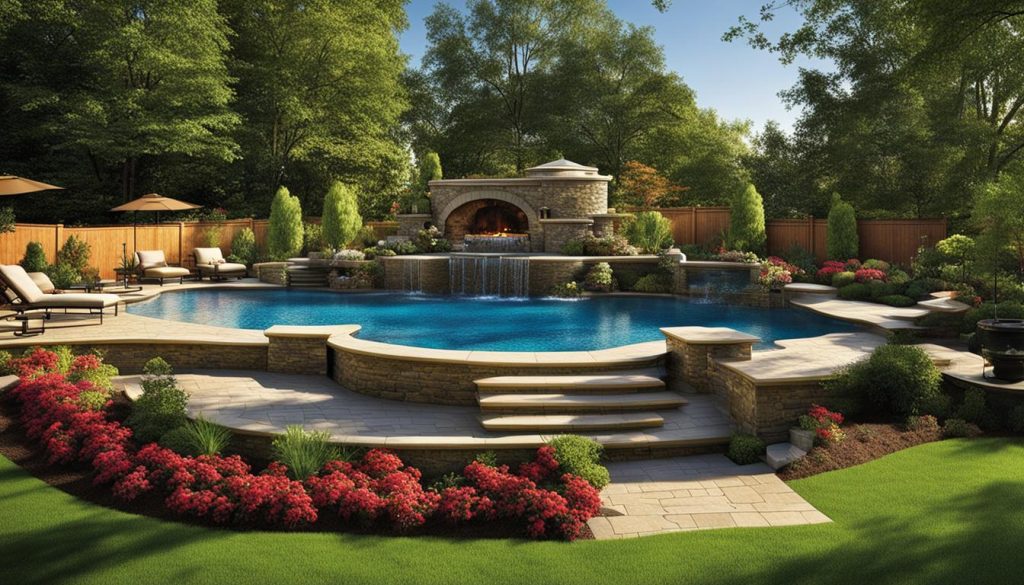
The Disadvantages of Traditional Pools
While traditional pools have their advantages, they also come with some drawbacks that are important to consider before making a decision for your Canadian home. Some of these disadvantages include:
| Disadvantages | Details |
|---|---|
| Chemical exposure | Traditional pools use chemicals like chlorine to keep the water clean, which can cause skin and eye irritation in some people, especially those with sensitive skin. |
| Environmental impact | The chemicals used in traditional pools can have a negative impact on the environment. Chlorine can react with organic compounds in the water to create disinfection byproducts (DBPs) that are harmful to aquatic life. |
| Maintenance costs | While traditional pools require less maintenance than natural pools, they still require regular upkeep to ensure proper water balance and cleanliness. This can add up over time, making traditional pools more expensive in the long run. |
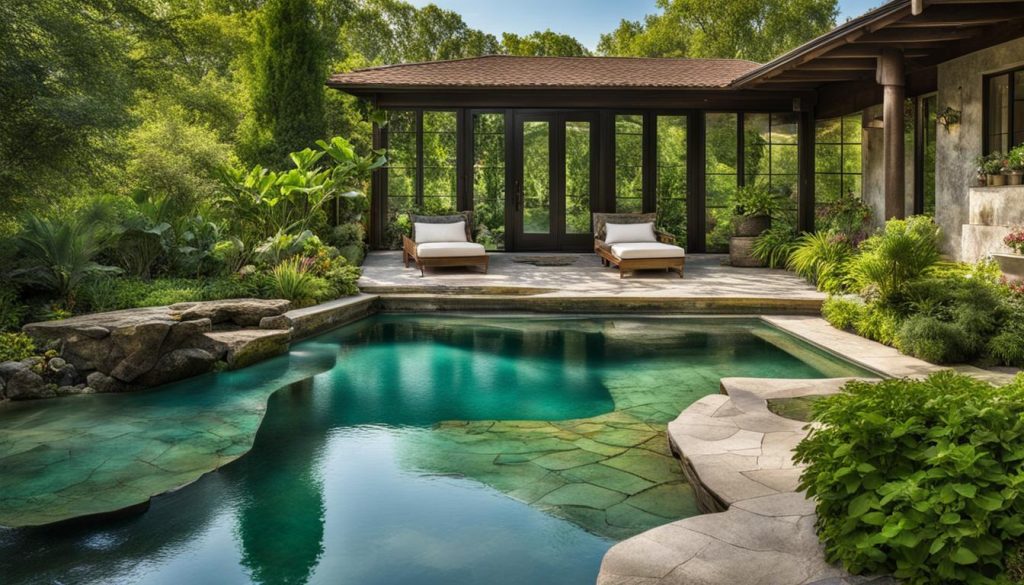
It’s important to weigh the advantages and disadvantages of both types of pools before making a decision. Consider your values and priorities, as well as your budget and long-term plans for your Canadian home. By doing so, you can make an informed choice that will provide you with years of enjoyment and relaxation in your own backyard.
Making the Choice for Your Canadian Home
Deciding between a natural pool and a traditional pool for your Canadian home can be a tough choice. But with our expert advice, you can make an informed decision that best suits your needs!
Consider your priorities and preferences. If you value a chemical-free and eco-friendly swimming experience, a natural pool may be the right choice for you. With its plant and natural filtration system, a natural pool can be a low-maintenance and sustainable option. It also enhances the aesthetics of your Canadian home with its natural-looking design.
However, if you prioritize crystal-clear water and lower maintenance, a traditional pool could be the better option. Traditional pools use chemical treatments to keep the water clean and clear. They also offer a wider range of design and customization options compared to natural pools.
Evaluate your needs, budget, and long-term plans. While natural pools can be more expensive to build initially, they can save you money in the long run due to their low-maintenance and chemical-free nature. On the other hand, while traditional pools may have lower upfront costs, their maintenance costs can add up over time.
Conclusion
In the end, the choice between a natural pool and a traditional pool comes down to personal preference and priorities. Both options have their advantages and disadvantages, so weigh them carefully before making your decision. We hope this article has given you a better understanding of the pros and cons of each type of pool and has helped you make the best choice for your Canadian home.
If you have any questions, our team is always happy to help. Pool Installers stands as your top-tier solution for professional pool installation services. Specializing in fiberglass, vinyl, and concrete installations, our skilled team brings your dream pool to life with precision. Whether it’s a sleek fiberglass design, the versatility of vinyl, or the durability of concrete, trust Pool Installers for a seamless and tailored approach to crafting your perfect aquatic oasis.
FAQ
What is a natural pool?
A natural pool, also referred to as an eco-pool or chemical-free pool, is designed to mimic the look and feel of a natural pond or lake. It utilizes plants, natural filtration systems, and beneficial bacteria to maintain water quality without the use of traditional chemicals like chlorine.
What are the benefits of natural pools?
Natural pools offer several advantages. They provide a chemical-free swimming experience, which is healthier for your skin, eyes, and respiratory system. They also support biodiversity by creating a habitat for plants and animals. Additionally, natural pools can enhance the aesthetics of your Canadian home with their natural-looking design.
What are the drawbacks of natural pools?
While natural pools have their benefits, they also have some drawbacks. They require more maintenance and monitoring to ensure proper water balance and clarity. They can be more expensive to build initially, and the water may not be as crystal clear as in traditional pools. Furthermore, some natural water treatments may have an earthy smell.
What is a traditional pool?
A traditional pool is the conventional swimming pool that most people are familiar with. It uses chemicals like chlorine to disinfect the water and maintain its cleanliness. These pools often have a concrete or fiberglass structure with a traditional filtration and heating system.
What are the advantages of traditional pools?
Traditional pools offer certain advantages. They provide clear and sanitized water, ensuring a safe swimming environment. They require less maintenance compared to natural pools and are generally less expensive to construct. Additionally, traditional pools offer more flexibility in terms of design and customization options.
What are the disadvantages of traditional pools?
Despite their advantages, traditional pools have some drawbacks. The chemicals used in these pools can cause skin and eye irritation, especially for individuals with sensitive skin. Traditional pools may also have a higher ecological impact due to the use of chemicals. Moreover, the maintenance costs of traditional pools can add up over time.
How do I choose between a natural pool and a traditional pool for my Canadian home?
When deciding between a natural pool and a traditional pool for your Canadian home, consider your priorities and preferences. If you value a chemical-free and eco-friendly swimming experience, a natural pool may be the right choice for you. However, if you prioritize crystal-clear water and lower maintenance, a traditional pool could be the better option. Evaluate your needs, budget, and long-term plans to make an informed decision.

